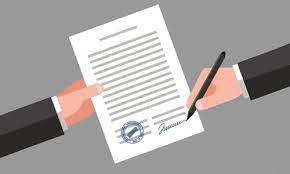Processing
Drafting contracts is an integral part of our lives. From buying and selling goods to renting accommodation, we constantly encounter the need to sign documents. However, this process can be complex and confusing for the average citizen. In this article, we will discuss the practical difficulties that may arise in the process of drafting contracts in Ukraine, as well as propose ways to overcome them.
1. Providing necessary documents: the key to successful contract formation
The first step in drafting a legal contract is gathering the necessary documents. However, collecting accurate information and relevant documents can be a daunting task. This stage can be challenging as it requires knowing which documents are mandatory for a specific type of contract. For example, purchase and sale agreements may require documents confirming ownership rights, leases, etc. Additionally, it is important to correctly analyze the documents provided by the other party to the contract. This will help avoid unforeseen risks and disputes in the future. When analyzing documents, attention should be paid to their legitimacy, correctness, and compliance with legislation. If you have any doubts or difficulties, it is better to consult a legal expert for advice and professional assistance.
2. The art of drafting legal contracts: decoding terminology
Words like "contract," "agreement," "contract" may seem simple at first glance, but drafting the correct legal document is a true art. Drafting legal contracts requires carefulness and precision. The main purpose of a legal document is to regulate rights and obligations between parties, so details matter greatly. When drafting a contract, clear, understandable, and unambiguous language should be used, avoiding double interpretations of terms. The correct choice of terms and their explanation in the contract contribute to avoiding misunderstandings and potential disputes.
3. Understanding terms: how to avoid misunderstandings and conflicts
One of the key aspects of drafting contracts is a clear understanding of the terms set out in the document. Incorrectly formulated or ambiguous terms can lead to misunderstandings and conflicts between parties. To avoid these problems, it is recommended to:
- Use clear and understandable language: avoid using complex legal terms and ensure clarity of the text.
- Clarify terms and concepts: if there is a need to use specific terms, it is necessary to define them in the contract itself or provide references to their definition in legislation.
- Verify the consistency of terms: make sure that all terms of the contract are agreed upon and correspond to the interests of both parties.
- Consult with a legal expert: in case of doubts or complex conditions, it is better to seek assistance from a lawyer for professional help and advice.
4. New technologies in contract preparation and signing: electronic signatures and online platforms
Modern technologies offer new opportunities for convenient and efficient drafting of legal contracts. Electronic signature allows parties to sign documents electronically, providing speed and convenience to the process. The use of online platforms (such as PaperLess, In Time, etc.) also enables efficient exchange of documents, making changes, and conducting negotiations in real-time. These new technologies simplify the process of drafting contracts, reducing the time and effort required for contract formation.
5. Advice from professionals: how to make the process of drafting contracts easier
Experienced lawyers and professionals can provide useful advice and recommendations on drafting legal contracts. They can highlight important aspects to consider when drafting a contract, as well as share practical examples and best practices. For example, they may advise:
- Use contract templates: this can simplify the drafting process and ensure standardization of terms.
- Pay attention to details: it is important to carefully read and understand each clause of the contract before signing it.
- Consult with professionals: seeking advice from a lawyer or notary can be helpful, especially in complex cases or significant amounts.
Drafting legal contracts in Ukraine can be a challenging task, but applying the above approaches and recommendations can help overcome practical difficulties and ensure successful contract formation. Understanding the importance of proper formatting, analysis, and writing of contracts allows citizens to avoid misunderstandings and conflicts, ensuring legal confidence and protection of their rights and interests.
































